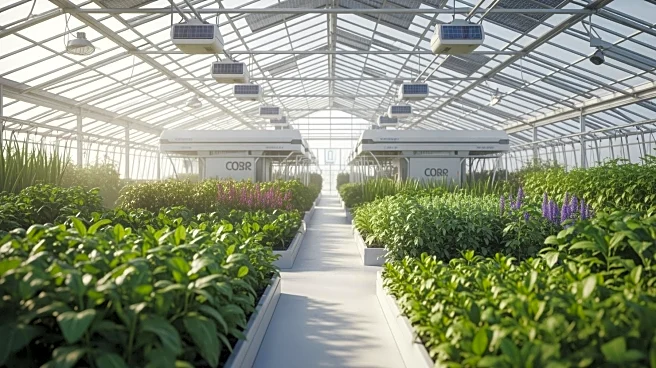What's Happening?
The agricultural sector is undergoing a significant transformation driven by technological innovations aimed at increasing efficiency and sustainability. Tools such as soil sensors, smart irrigation systems,
and eco-friendly farming practices are being adopted to enhance productivity while minimizing environmental impact. These advancements allow farmers to make informed decisions, anticipate pest problems, and address nutrient deficiencies without resorting to harmful practices. Biotechnology is also playing a crucial role by developing resilient seeds adapted to various climates, further promoting sustainable productivity. This technological shift is empowering farmers and agribusinesses, creating economic opportunities and ensuring high-quality food production.
Why It's Important?
The integration of technology in agriculture is crucial for addressing the growing pressures of increased food demand, resource protection, and climate change adaptation. By adopting sustainable practices, farmers can generate high-value products, create jobs, and access new markets, thereby reshaping business models. This approach not only enhances competitiveness but also provides access to eco-certifications and recognition from environmentally conscious consumers. Furthermore, small and medium-sized producers can benefit by joining larger value chains, strengthening local economies and promoting balanced development. The combination of innovation and sustainability is essential for ensuring the long-term viability of the agricultural sector.
What's Next?
As the agricultural sector continues to embrace technological advancements, education and training will become increasingly important. Understanding advanced techniques and the efficient use of technological tools will enable better results and minimize negative impacts. Collaborative efforts among companies, researchers, and producers can create an ecosystem where innovation is shared, enhancing the sector's resilience to economic and environmental challenges. The future of agriculture lies in the integration of technology, sustainability, and business vision, ensuring that current needs are met without compromising those of future generations.
Beyond the Headlines
The transformation of agriculture through technology and sustainability has deeper implications for environmental responsibility and economic growth. By balancing technological progress with environmental care, farmers can improve their reputation and customer loyalty. The integration of organic farming techniques, crop rotation, efficient water use, and renewable energy complements technological advancements, ensuring profitability and environmental friendliness. This holistic approach strengthens the entire value chain, from production to commercialization, and highlights the importance of responsible practices in modern agriculture.












